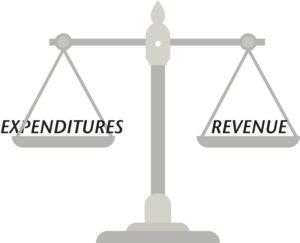Almost everyone agrees that they should have balanced budgets, that is, that they should not spend more money than they take in. It makes perfect sense for individuals, so why not for our federal government?
Actually, there are several reasons why requiring a balanced budget for the federal government would be a very bad idea. For starters, let’s consider the assumption about individuals having balanced budgets. If this were really the case, we would not be able to get home mortgages, student loans, or finance the purchase of a car. We would not be able to borrow money for such sound investments in our future.
Requiring a balanced budget makes no more sense for the federal government than it does for individuals. The federal government needs the flexibility to do things like respond to natural disasters, public health epidemics, military threats, demographic changes, and economic downturns, among other things. What appears to be a commonsense approach is actually very bad public policy.
What is a Balanced Budget Amendment (BBA)?
 A balanced budget amendment is a proposed federal constitutional rule requiring that the government not spend more than its income in a given year. Most state constitutions have balanced-budget provisions and most of these make an exception for times of war or national emergency, or allow the legislature to suspend the rule by a supermajority vote. The U.S. Constitution does not require a balanced budget. Some members of Congress are looking to change that by passing legislation to add an amendment to the U.S. Constitution.
A balanced budget amendment is a proposed federal constitutional rule requiring that the government not spend more than its income in a given year. Most state constitutions have balanced-budget provisions and most of these make an exception for times of war or national emergency, or allow the legislature to suspend the rule by a supermajority vote. The U.S. Constitution does not require a balanced budget. Some members of Congress are looking to change that by passing legislation to add an amendment to the U.S. Constitution.
Why is a BBA Harmful?
It will result in cuts to Medicaid, Medicare, Social Security, and other large programs. Programs like Medicaid, Medicare, Supplemental Security Income (SSI), and Social Security are a large part of the federal budget. They are projected to grow in the next several years primarily due to the aging of the population. Since these are very popular and critical programs, Congress has been unable to make direct cuts to them and some Members are now looking to try less direct methods, including a BBA.
Social Security and Medicare are particularly vulnerable to cuts because a BBA prohibits spending from exceeding revenues collected in that year. These programs operate with trust funds that collect dedicated payroll taxes designated for specific programs which are partially paid out in future years to meet projected population needs. For example, in years when Social Security collects more than it pays in benefits and other expenses (which it has done every year since 1984), the Treasury invests the surplus in interest-bearing Treasury bonds and other Treasury securities. These bonds can be redeemed whenever needed to pay benefits. The trust fund balances allow benefits to be paid when the Social Security program’s current income is insufficient by itself. Under a BBA, the $2.9 trillion in Treasury securities held in the Social Security Trust Fund would not be available to help pay benefits to the baby boomers for retirement or disability since almost all of it was collected in prior years.
It would harm the economy. A BBA would likely cause significant harm to the economy, making recessions both deeper and longer. In an economic slowdown, revenues (mostly taxes) fall while spending for unemployment and other benefits increases. A BBA would force policymakers to cut federal programs, raise taxes, or both when the economy is weak or already in recession, the exact opposite of what good economic policy would advise, according to the Center on Budget and Policy Priorities.
It is extremely hard to change. An amendment to the Constitution is a dramatic step that takes a lot of time to enact. Unlike typical legislation, once a constitutional amendment has passed, it is extremely difficult to undo.
What is Happening in Congress?
There are two BBA bills that have been introduced in the House of Representatives by Representative Bob Goodlatte (R-VA) – H.J. Res 1 and H.J. Res 2 – that Congress may vote on. While both versions are very harmful, H. J. Res 1 is the most drastic one since it essentially prohibits tax increases (by requiring a three-fifths vote in the House and the Senate) and limits spending to 20 percent of the economy (gross domestic product(GDP)). The House may vote on one of these bills as soon as next week.
Key Points for Advocates
People with disabilities, their families, and advocates can:
- Speak concretely about how their lives will be upended if the dramatic spending cuts forced by a BBA were to happen. What would happen if Medicaid, Social Security, and other programs were severely cut?
- Call out the contrast – Question how Members of Congress can call for such drastic action to reduce deficits when they recently voted to add over $1 trillion over 10 years to the nation’s deficits in the tax law enacted on December 20, 2017. See House votes here and Senate votes here.
- Share what many leading economists believe – a BBA to the U.S. Constitution is very unsound economic policy.
For more information, see:


 A balanced budget amendment is a proposed federal constitutional rule requiring that the government not spend more than its income in a given year. Most state constitutions have balanced-budget provisions and most of these make an exception for times of war or national emergency, or allow the legislature to suspend the rule by a supermajority vote. The U.S. Constitution does not require a balanced budget. Some members of Congress are looking to change that by passing legislation to add an amendment to the U.S. Constitution.
A balanced budget amendment is a proposed federal constitutional rule requiring that the government not spend more than its income in a given year. Most state constitutions have balanced-budget provisions and most of these make an exception for times of war or national emergency, or allow the legislature to suspend the rule by a supermajority vote. The U.S. Constitution does not require a balanced budget. Some members of Congress are looking to change that by passing legislation to add an amendment to the U.S. Constitution. The House and Senate bills reduce federal revenue by about $1.5 trillion over 10 years. Members of Congress have acknowledged that passing these tax cuts will make it easier to justify spending cuts down the road. The Congressional Budget Office (CBO) also notes that automatic spending cuts may be triggered if Congress does not act to prevent them. These automatic cuts could mean a $25 billion dollar cut to Medicare in 2018. Automatic spending cuts could also slash funds that go to states to operate critical programs such as the Vocational Rehabilitation state grant program and the Social Services Block Grant.
The House and Senate bills reduce federal revenue by about $1.5 trillion over 10 years. Members of Congress have acknowledged that passing these tax cuts will make it easier to justify spending cuts down the road. The Congressional Budget Office (CBO) also notes that automatic spending cuts may be triggered if Congress does not act to prevent them. These automatic cuts could mean a $25 billion dollar cut to Medicare in 2018. Automatic spending cuts could also slash funds that go to states to operate critical programs such as the Vocational Rehabilitation state grant program and the Social Services Block Grant.





